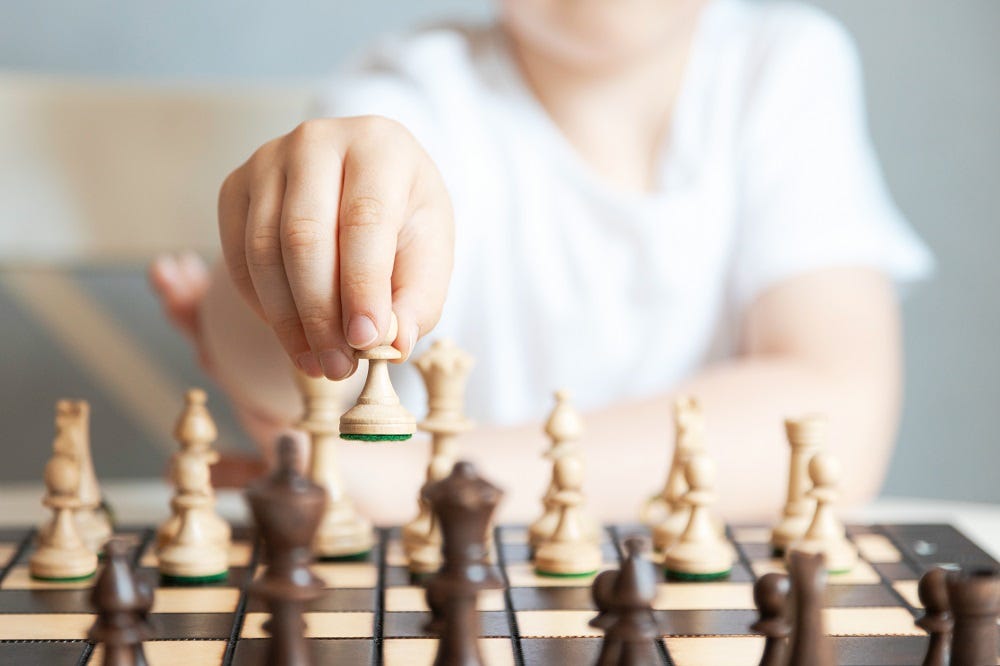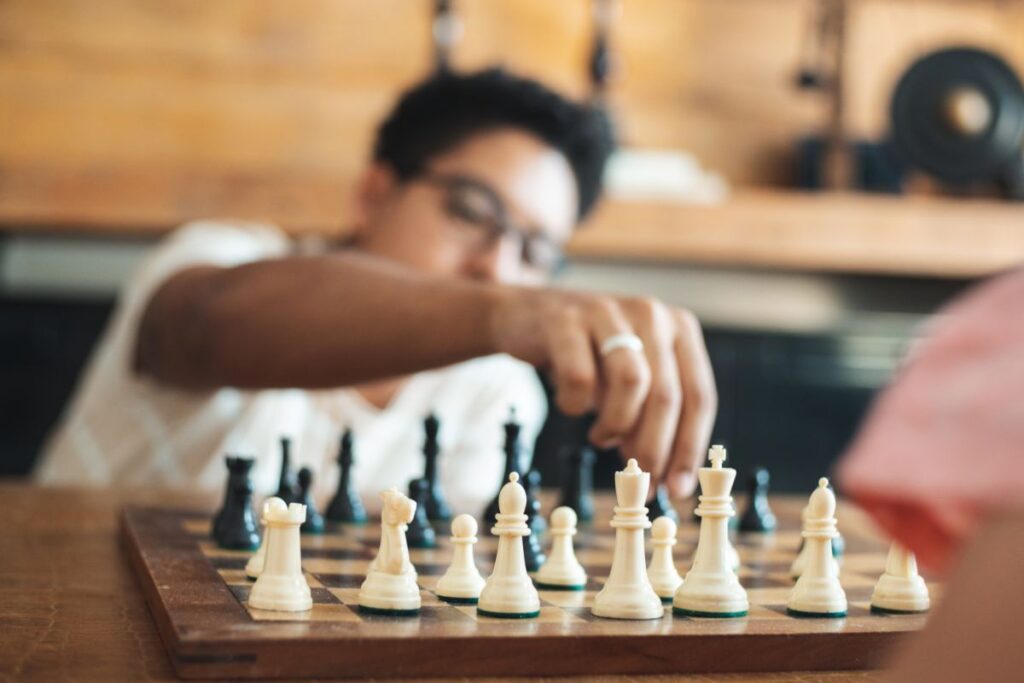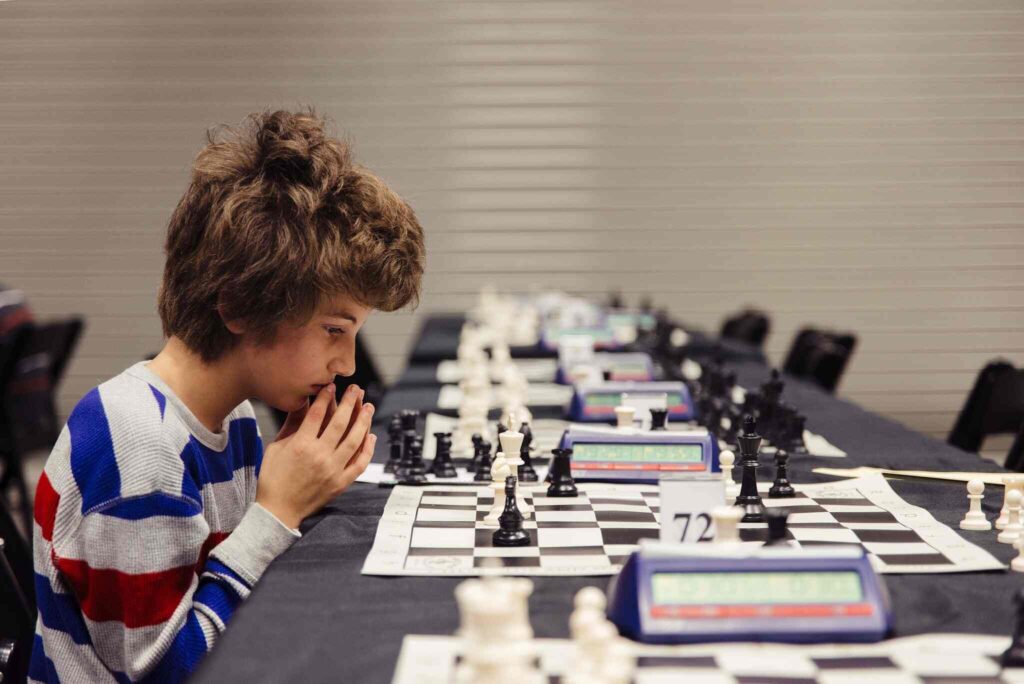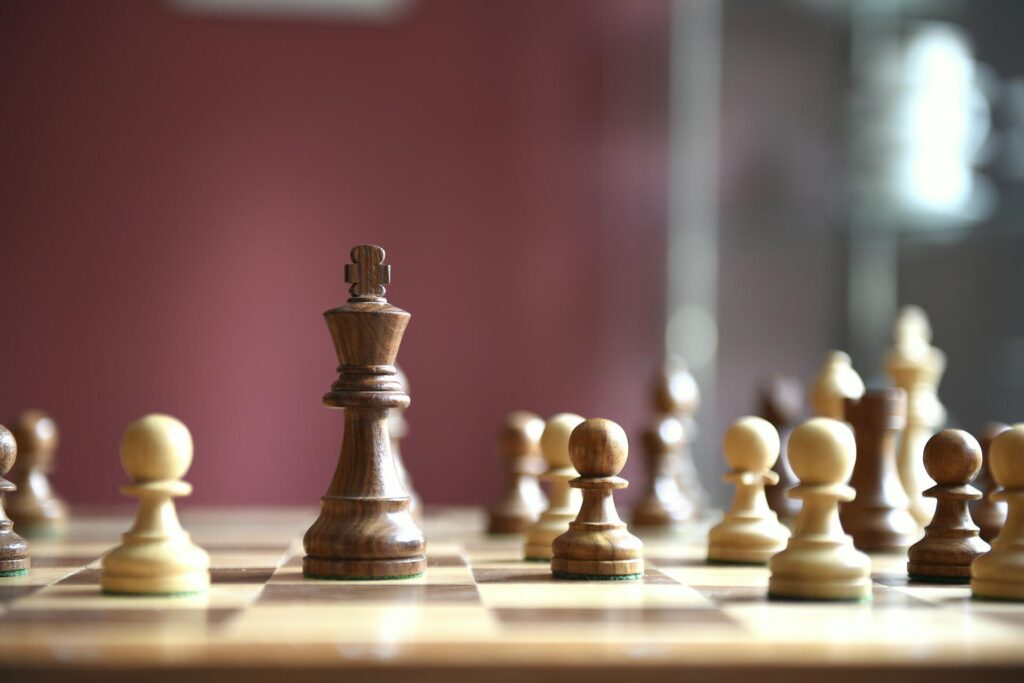Chess is more than just a game. It’s a tool that helps develop skills that last a lifetime. Many people view it as a simple board game where two opponents move pieces around in hopes of winning. But if you look closely, chess is like a brain gym. Every move, every strategy, and every piece plays a role in shaping how we think, plan, and solve problems. For children, especially, chess is a valuable tool for learning. It helps create strong mental habits that go beyond the chessboard. Let’s explore why chess helps build stronger learning foundations and how it influences many areas of life.
The Connection Between Chess and Thinking Skills
Chess makes you think deeply. From the very first move, you need to plan ahead. You can’t just move a piece without considering the consequences.
This is where the magic of chess begins. When playing, your brain is forced to make decisions, solve problems, and think about many possibilities. These are the same skills needed in school and everyday life.
For example, in math, you need to solve problems by considering different steps, just like in chess. Or in reading, you have to understand what comes next in a story, much like predicting your opponent’s next move.
By playing chess, students learn to think critically. This means they don’t just take things at face value. They analyze situations, look for hidden details, and make informed decisions.
Whether it’s solving a math problem or figuring out a complex reading passage, the skills learned from chess help make these tasks easier.
Planning and Strategy
One of the first things you learn in chess is the importance of planning. Every move should serve a purpose. Good players don’t just react to their opponent’s moves—they have a plan. This ability to think ahead is key in learning.
In school, students are often asked to write essays, solve problems, or complete projects. Each of these tasks requires a clear plan.
Chess trains the brain to think several steps ahead, making it easier to break down tasks into smaller, manageable parts.
Planning is also essential in time management. In chess, players often have a time limit. You have to make decisions quickly, but those decisions must also be well-thought-out. This is similar to real-life situations where students must complete assignments by a deadline.
Chess teaches how to use time wisely, balance urgency with careful thought, and work under pressure without losing focus.
Problem Solving
Problem-solving is at the heart of chess. Each move presents a problem, and each player is looking for the best solution. Sometimes, the best move isn’t obvious.
You might need to sacrifice a piece to gain an advantage later. In learning, this skill is invaluable. Life and education are full of challenges that don’t have easy answers.
Chess helps players develop the patience and focus needed to work through tough problems, whether it’s a tricky homework assignment or a difficult situation in life.
Through chess, students learn that failure is part of the process. Not every move will lead to victory. But each mistake teaches a valuable lesson. In the same way, students who face challenges in school can learn from their mistakes, improve, and move forward.
Chess encourages this mindset, helping learners become more resilient and persistent.
Memory Improvement Through Chess
One of the less obvious benefits of playing chess is how it improves memory. As you play, you must remember previous moves, past games, and specific strategies.
This helps strengthen your brain’s ability to recall information, which is a crucial part of learning in any subject. In school, students often need to remember formulas, facts, dates, and vocabulary. The process of remembering how a piece moves, or which strategy worked in a previous game, sharpens this skill naturally.
In chess, there are patterns. Recognizing these patterns during the game helps players react faster and make smarter choices. Over time, a player builds a mental library of moves and strategies.

This is very similar to learning in school, where understanding patterns in math, language, or science helps students solve problems quicker. Chess players learn to store this information in their memory and pull it out when needed, much like a student recalling key points during an exam.
But it doesn’t stop with just remembering moves. Chess also strengthens working memory. Working memory is what allows you to hold information in your brain while you work on a task.
For example, in math, you hold numbers in your head while solving a multi-step problem. In reading, you hold the main idea while thinking about other details. Chess constantly exercises this part of the brain, making students better at handling multiple tasks at once.
Focus and Concentration
In a world full of distractions, focus and concentration are becoming rare skills. Chess demands full attention.
From the first move to the last, every action requires thought. There’s no time to drift off, or you’ll lose. Chess teaches students the power of staying focused for extended periods of time, which is essential for learning.
This kind of focus extends far beyond the game itself. When students practice concentrating in chess, they naturally improve their ability to focus in the classroom. Whether they are reading a long passage, writing an essay, or solving a math problem, they can apply the same concentration they used in chess.
Chess shows how focus leads to success, which can inspire students to pay more attention to their studies.
Moreover, chess teaches how to manage distractions. Even in the most intense game, players must block out noise and focus solely on the board. In the same way, students who play chess are better able to ignore distractions like phones or noise in the classroom, allowing them to stay on track with their work.
Chess and Patience
Patience is another skill developed through chess. A good chess game can last for hours. During this time, players must stay calm, think carefully, and wait for the right moment to act.
Rushing usually leads to mistakes. In today’s fast-paced world, many students struggle with the need for immediate results. Chess teaches the value of waiting, analyzing, and making thoughtful decisions.
In learning, patience is crucial. Not every subject will come easily. Some students need to spend extra time on a topic before they fully understand it.
Chess encourages them to slow down, keep working, and trust that with time, they will improve. This mindset is essential for long-term success in both academics and life.
Building Emotional Strength
Chess is not just a mental game; it’s an emotional one too. Losing a game can be tough, especially after investing a lot of time and effort. But in chess, as in life, failure is part of the process.
Chess teaches students how to handle setbacks gracefully. Instead of getting discouraged, players learn to analyze what went wrong and try again.
In the classroom, this emotional resilience is key. Many students face challenges in their studies, whether it’s failing a test or not understanding a lesson.
Chess teaches them to approach these challenges with a growth mindset. They learn that failure is not the end, but an opportunity to improve. This emotional strength makes students more confident and ready to tackle future problems head-on.
Another aspect of emotional development in chess is learning to control impulses. It’s easy to make a quick move without thinking, but this often leads to mistakes.
Chess teaches the value of pausing, thinking things through, and controlling the urge to act too quickly. This self-control is beneficial in all areas of life, especially in school, where students need to take their time to fully understand a subject before jumping to conclusions.
Enhancing Creativity

Chess might seem like a strict game with set rules, but it’s also a space for creativity. Every player has their unique style of playing, and the game offers countless possibilities for creative solutions.
When students play chess, they are constantly looking for new ways to outsmart their opponent. This encourages thinking outside the box and finding innovative strategies.
Creativity is an essential skill in learning. Whether it’s coming up with an original idea for a project or solving a problem in a different way, creativity makes learning more dynamic. Chess helps students tap into this creative side of their brain, allowing them to approach schoolwork from new angles.
Chess and Discipline
Discipline is a key component of success, both in chess and in life. Chess teaches discipline in a few important ways. First, players must follow the rules of the game and respect the limits of each piece.
Second, they must practice regularly if they want to improve. It takes time, dedication, and effort to become good at chess, and this instills a strong sense of discipline.
In school, discipline is equally important. Students need to stay organized, complete homework on time, and pay attention in class. Chess teaches them that progress comes through consistent effort.
Just like in chess, where skipping practice leads to poor results, in school, a lack of discipline will lead to struggles. Chess gives students the tools they need to stay focused on their goals and put in the hard work necessary to achieve them.
The Social Benefits of Chess
While chess is often seen as a quiet, solitary game, it can also be a social experience.
When students play chess, they often engage in friendly competition, whether in school clubs, tournaments, or online platforms. These interactions help develop important social skills. Players learn how to communicate with others, show good sportsmanship, and respect their opponents.
In a broader sense, chess teaches the value of collaboration. Students often discuss strategies, learn from each other, and even teach their peers new techniques. This creates a supportive community of learners.
The ability to work well with others, share ideas, and accept both victory and defeat gracefully is a skill that translates well to both the classroom and life.
Decision-Making Under Pressure

Chess often puts players in situations where they have to make critical decisions quickly. A chess clock limits the time you have to think, forcing you to make important moves under pressure.
This teaches students to remain calm in stressful situations and make smart choices even when the clock is ticking. In school, students face similar pressures, such as completing exams within a time limit or finishing a project before a deadline.
Chess teaches the skill of managing stress and making thoughtful decisions under time constraints. The ability to stay calm, focused, and decisive when faced with a challenge is something that helps students not only in academics but in every part of their lives.
Logical Thinking and Analytical Skills
Chess is deeply rooted in logic. Every move must have a reason behind it. Players quickly learn to assess the board, analyze their opponent’s moves, and consider all possible outcomes before making their next move. This process develops strong analytical thinking skills.
Logical thinking is crucial for subjects like math and science, where students are required to solve complex problems step-by-step. In language arts, logic comes into play when organizing essays or analyzing stories.
Chess sharpens these analytical abilities by requiring players to constantly evaluate different scenarios and choose the best course of action. This strengthens a student’s ability to approach academic challenges in a logical, structured way.
Boosting Confidence Through Mastery
One of the most rewarding aspects of chess is the sense of accomplishment that comes with mastering the game. As students get better at chess, they gain confidence in their ability to think strategically and solve problems.
Every victory, even if small, boosts self-esteem and reinforces the belief that hard work and practice lead to improvement.
This newfound confidence doesn’t stay on the chessboard. Students carry it into the classroom and their personal lives.
When they see themselves improve in chess, they start to believe they can improve in other areas too. Whether it’s overcoming a difficult subject or learning a new skill, the self-assurance developed through chess encourages students to take on new challenges with a positive attitude.
Chess and Academic Performance
Research has shown a direct link between chess and improved academic performance. Students who regularly play chess tend to do better in subjects like math, reading, and problem-solving.
The cognitive skills developed through chess—like memory, focus, and critical thinking—help students in many areas of their education.
For example, chess improves spatial awareness, which is important for geometry and other math-related tasks. It also enhances reading comprehension by training the brain to predict and understand patterns, much like following a narrative in a book.
Chess players often show better performance in subjects that require high-level thinking and problem-solving because they’ve already trained their brains to tackle challenges methodically.
Chess and Lifelong Learning
One of the greatest gifts chess gives is the love for learning. Chess players, whether young or old, become lifelong learners because the game itself is infinite.
There is always a new strategy to discover, a better move to make, or a new opponent to challenge. This mindset of constant improvement is one that serves students well throughout their academic journey and into adulthood.
In the classroom, this translates to a thirst for knowledge and a willingness to take on new subjects and challenges. Chess teaches students that learning never truly ends and that there’s always room to grow and get better.
Chess and Emotional Intelligence

Chess not only sharpens the mind but also nurtures emotional intelligence (EQ), an often overlooked area of development in young learners. Emotional intelligence is the ability to recognize, understand, and manage one’s emotions, as well as empathize with others.
Through chess, students encounter emotional highs and lows—moments of victory and defeat—which offer valuable lessons in emotional control and self-awareness.
During a game of chess, players experience intense moments where they might feel excited after a good move or frustrated when things don’t go as planned. Learning how to stay calm and not let emotions dictate their actions is a major part of emotional intelligence.
Chess teaches players to reflect on their feelings and act logically despite them. This emotional maturity helps students manage stressful situations in school, like exams or conflicts with classmates.
Chess also teaches empathy. By understanding an opponent’s perspective and predicting their moves, players develop the ability to put themselves in someone else’s shoes. This skill transfers into real life, where students learn to understand and respect the emotions and intentions of others, leading to better relationships with peers and teachers alike.
Patience and Delayed Gratification
In a world where instant results are often expected, chess teaches the importance of delayed gratification. Many students are accustomed to immediate feedback—quick answers from the internet, instant messaging, and fast results in games.
Chess is different. A well-played game can take hours, and the payoff for a good strategy might not be seen until much later in the match.
This trains students to wait for results and be patient. They learn that some rewards, whether it’s a chess victory or mastering a new subject in school, take time to achieve. In life, success often comes slowly and requires perseverance. Chess is a gentle reminder that the journey towards achieving a goal is just as important as the end result.
Delayed gratification is especially important in learning. Students must often put in hours of study, practice, and effort before they see improvements in their grades or skills. Chess reinforces the value of hard work and patience, encouraging students to stay committed to long-term goals instead of seeking immediate satisfaction.
Chess and Spatial Reasoning
One of the most unique ways chess influences learning is by enhancing spatial reasoning skills. Spatial reasoning is the ability to think about objects in three dimensions and how they relate to each other.
It’s essential for subjects like math, science, and even art. In chess, players constantly need to visualize the board and predict where pieces will be in the future. This mental exercise develops a student’s ability to manipulate objects in their mind, an important skill in areas like geometry, architecture, and engineering.
In math, for instance, students often need to understand shapes, angles, and how different figures relate to one another. Chess strengthens this ability by encouraging players to think several moves ahead and visualize the board as it will be in the future, not just as it is in the moment.
Moreover, spatial reasoning is critical for understanding maps, graphs, and diagrams, skills that are useful in subjects like geography and physics. The constant practice of moving pieces around a chessboard helps students better grasp these concepts, making learning more intuitive.
Chess and Academic Discipline
Consistency and dedication are key to improving in chess. Students quickly learn that to get better at chess, they need to practice regularly. This dedication to improvement spills over into their academic lives.
Chess teaches that mastering any subject—whether it’s math, science, or literature—takes consistent effort over time.
When students play chess, they engage in a process of gradual self-improvement. Each game, win or lose, provides an opportunity to learn something new.
They analyze their mistakes, adapt their strategies, and come back stronger in the next game. This habit of self-reflection and constant improvement helps build academic discipline.
Chess also instills the importance of setting goals. Whether it’s trying to improve at opening strategies or aiming to defeat a tough opponent, students learn to set clear objectives and work steadily towards them.
This same approach can be applied to schoolwork, where setting small, manageable goals helps students achieve larger academic success.
Chess and Ethical Thinking
Ethics and fairness play a vital role in chess. The game operates on strict rules, and any form of cheating is not only discouraged but looked down upon.
Students who play chess learn the importance of honesty, fair play, and integrity. These values are essential both on and off the chessboard.
When faced with challenges, students must make ethical decisions during the game. Should they play conservatively or take a risk?
Should they resign when defeat is inevitable, or fight until the end? These decisions mirror real-life ethical dilemmas that students may face, such as choosing whether to help a classmate in need or whether to stand up against wrongdoing.
The respect chess players develop for their opponents also translates into real-world respect for peers and teachers. Win or lose, students learn to value sportsmanship and handle outcomes with grace.
These ethical lessons from chess encourage students to act with integrity and fairness in all areas of life.
Chess as a Tool for Inclusivity
Chess is an inclusive game. It does not matter how old you are, where you come from, or what language you speak—on the chessboard, everyone is equal.
This inclusivity makes chess a powerful tool for building community and fostering relationships between people of different backgrounds.
In schools, chess can help break down social barriers. Students who might not have interacted with each other in other settings can come together through their shared love of the game.
This creates a sense of belonging and encourages positive interactions between students of diverse cultures, personalities, and ages.
Chess promotes equality in the classroom, too. Unlike some subjects where students with natural talents might excel quicker than others, chess allows everyone to start on the same level.
With practice, anyone can improve, making it an empowering activity for students who might struggle in other areas of school. This sense of achievement boosts confidence and creates a learning environment where all students feel capable and included.
Final Thoughts: Chess as a Lifelong Teacher
Chess teaches lessons that extend far beyond the board. It challenges the mind, shapes behavior, and helps build essential life skills that prepare students for academic success and real-world challenges.
Through patience, focus, creativity, and discipline, chess molds individuals into better thinkers, problem-solvers, and decision-makers.
Chess and Lifelong Learning
The skills developed through chess aren’t just useful in school; they apply throughout life. The discipline to practice, the patience to wait for the right opportunity, the resilience to bounce back from setbacks—these are qualities that help in every stage of life.

Chess nurtures a mindset of continuous learning and growth. There’s always more to discover, both in the game and in life.
Chess for All Ages
Whether you’re a young student just starting your educational journey or an adult looking for ways to keep your mind sharp, chess offers endless benefits.
It’s a game that grows with you, providing new challenges and insights at every level. The strategies you learn as a beginner will deepen as you become more advanced, making chess a lifelong companion in learning.
Building a Stronger Future Through Chess
At the heart of chess is the idea of thinking ahead. In both the game and in life, planning for the future leads to better outcomes. By encouraging logical thinking, emotional maturity, and self-reflection, chess equips individuals with the tools they need to create a brighter, more successful future.
At the Global School of Chess, we believe that chess is more than just a game—it’s an investment in your cognitive and emotional development.
If you’re ready to experience the benefits of chess firsthand and build a stronger learning foundation, we’re here to help. Reach out today, and let’s explore the endless possibilities that chess offers for growth and success.
Wrapping It Up
Chess is more than a game—it’s a powerful tool for developing the mind. It builds the foundations of critical thinking, discipline, patience, and creativity, all while nurturing emotional resilience and social skills. The lessons learned from chess extend far beyond the board, offering lifelong benefits for students of all ages.
At Global School of Chess, we’re passionate about helping learners unlock their full potential through chess. Whether you’re looking to enhance academic performance, improve focus, or simply enjoy the beauty of the game, we’re here to guide you every step of the way. The mental and emotional skills cultivated through chess will help you thrive in school, work, and life.
Ready to experience the transformative power of chess? Visit Global School of Chess and start building a stronger learning foundation today.
READ NEXT:

